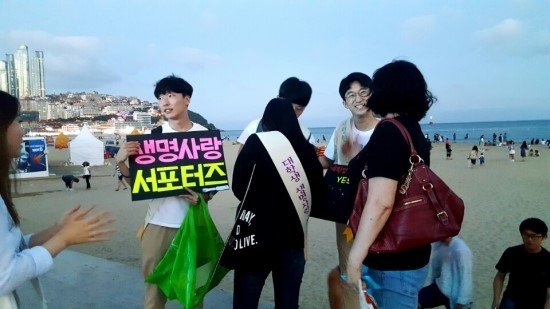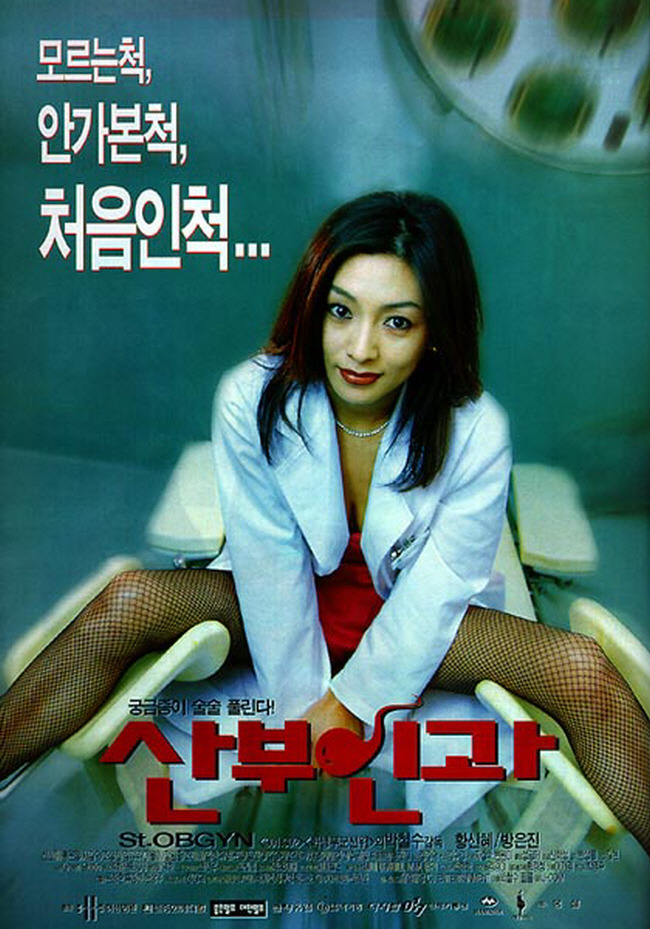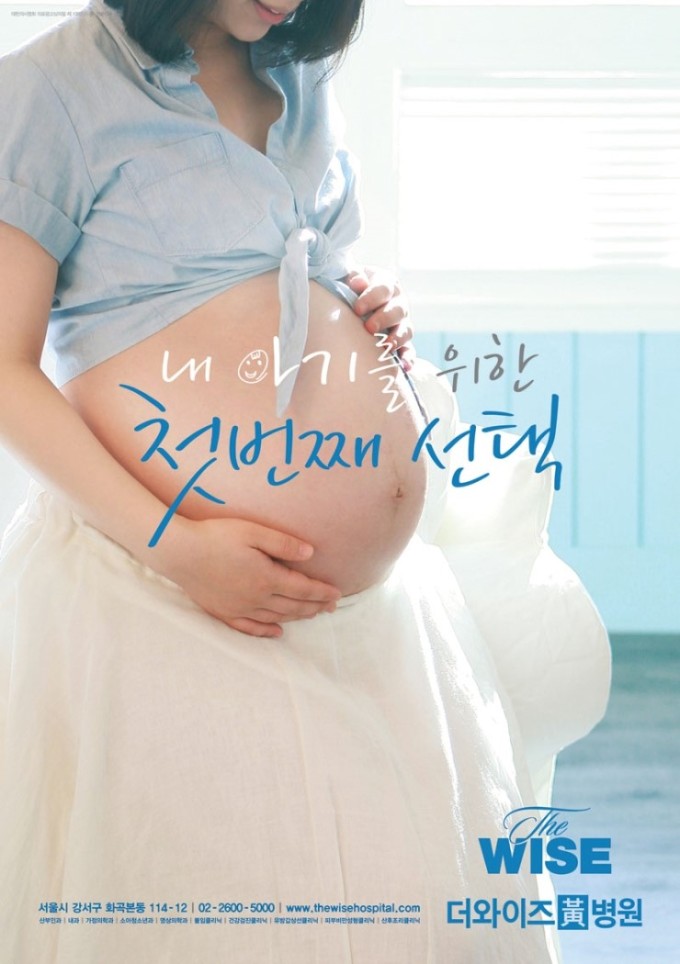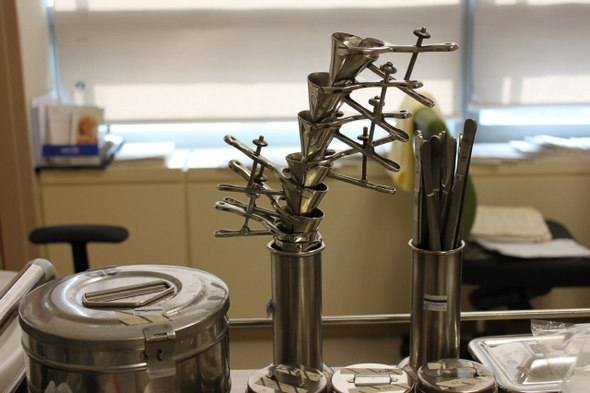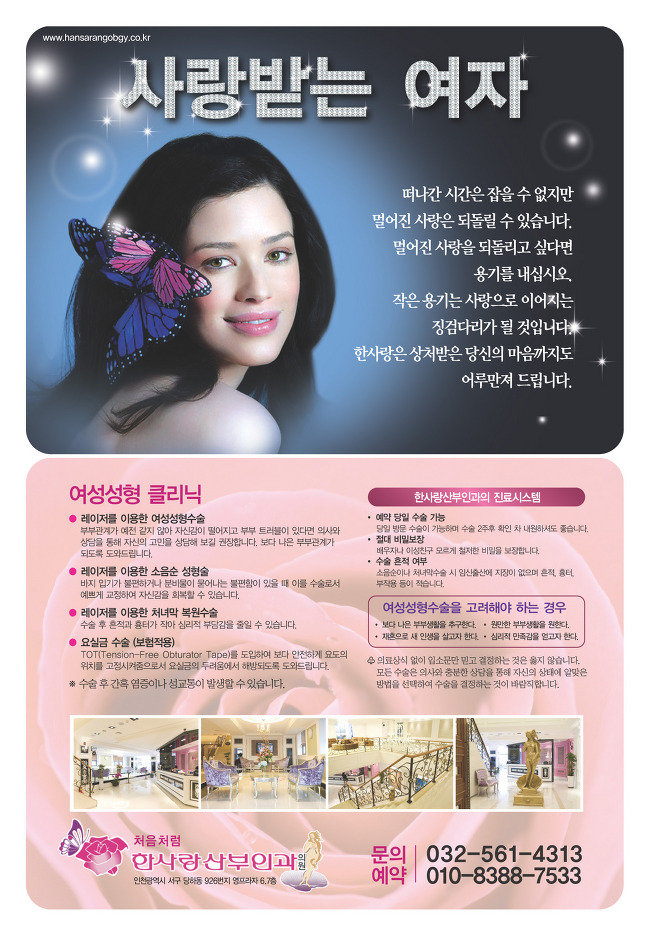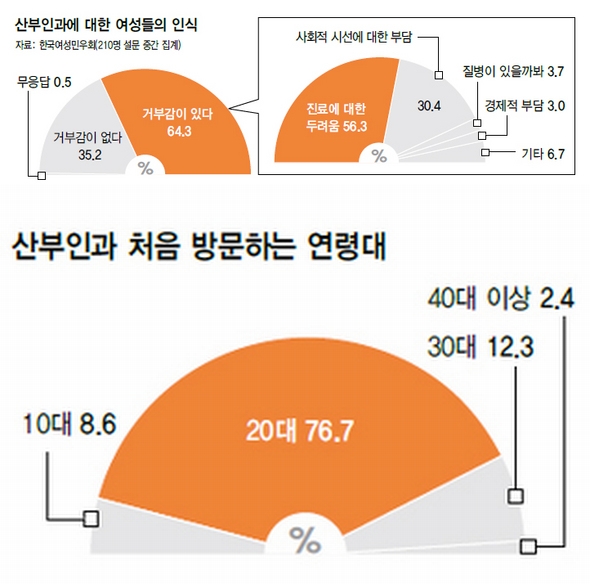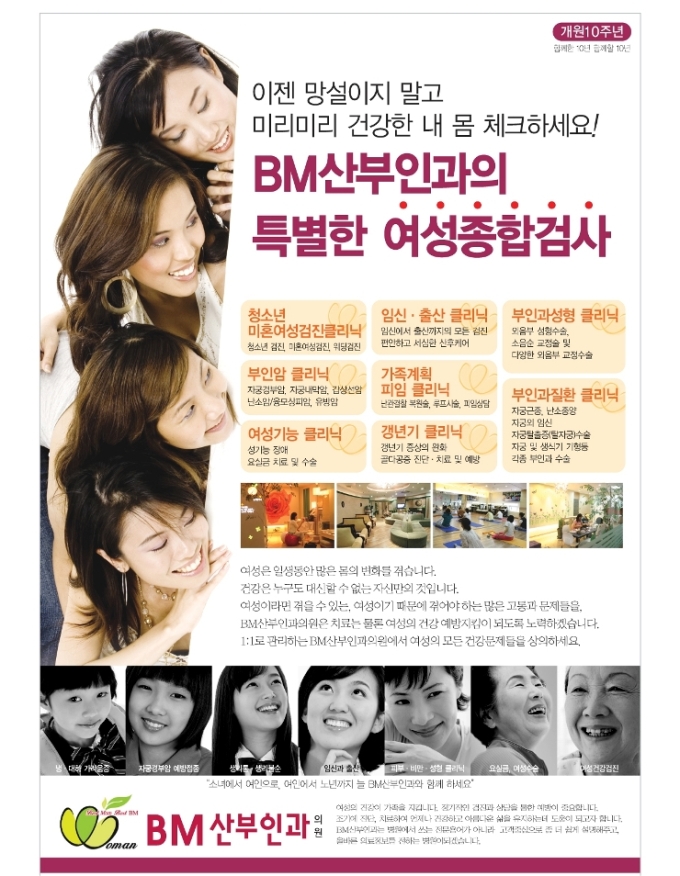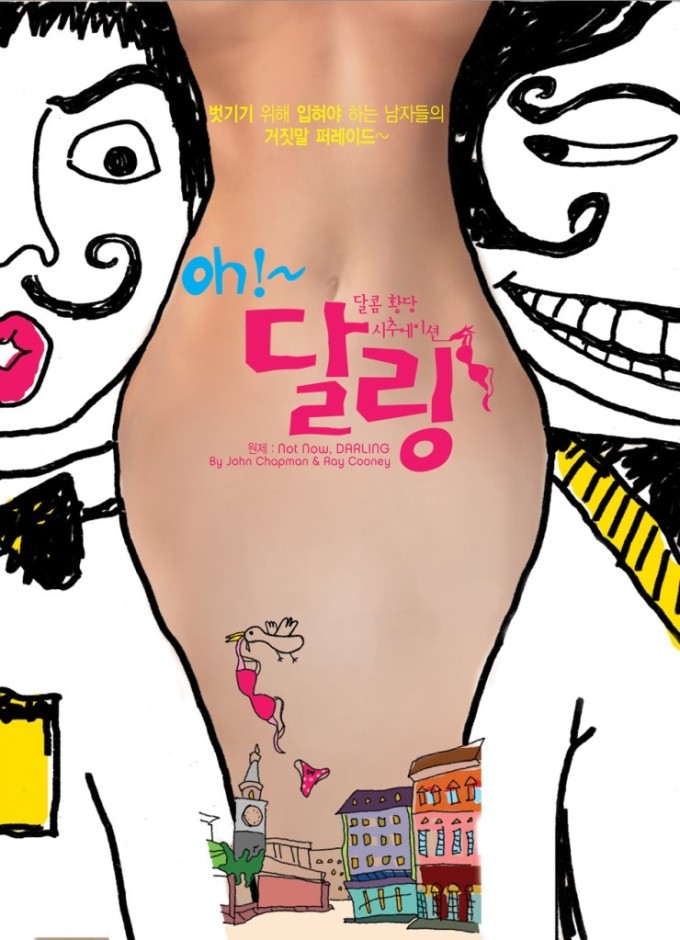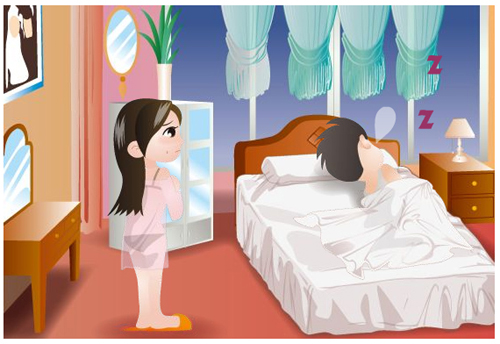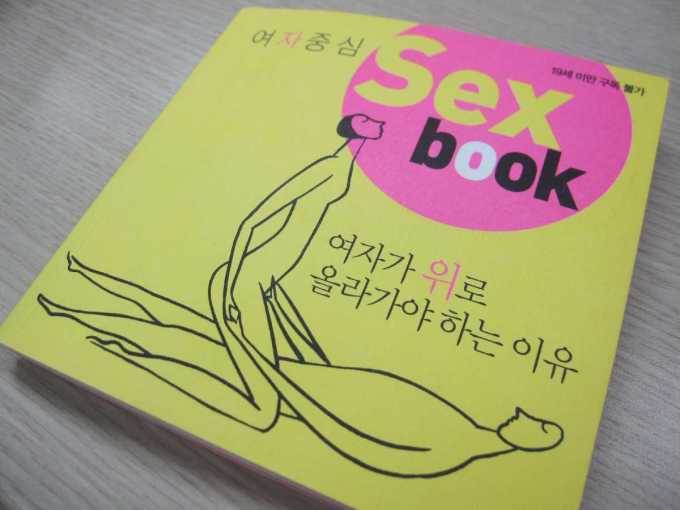Okay, maybe I have overdone it a little with that above image. Because I certainly I don’t mean to appear flippant about the subject of abortion.
But hear me out — something just snapped in me when I saw the unnecessarily sombre cover (and tone) of Womenlink’s new book on abortion below. Because in reality, most abortion patients and their partners report feeling more relieved than depressed and regretful, despite what you usually read about them in the media.
So, the humor of the Yoda-like, oddly-appropriate Engrish above felt like a very welcome antidote. As did the additional images of happy couples you’ll find throughout this post, used in lieu of much harder to find “relieved” (안심했다? 안심이다?) ones.
Also, it was ironic that something that set out to challenge stereotypes would confirm so many of my own in the process. Namely, that all too many Koreans are forced to seek abortions because of a lack of basic knowledge about contraception, and that women are still wary of keeping condoms on hand and/or insisting their partners use them, lest they “be regarded as a slut or an experienced and impure woman” (which in turn leads to the perception that contraception is only men’s responsibility).
But don’t get me wrong — these are minor quibbles really, and otherwise I have nothing but praise for the book!
‘낙태’ 사회적 배경을 이야기하는 이유, The reason why we talk about the social background of ‘abortion’
Ildaro, November 15th 2011
민우회, 낙태 사례집 <당신이 생각하는 낙태는 없다> 발간 의의, The Significance of the Publication of Womenlink’s Abortion Casebook There’s no such thing as the abortion you’re thinking of
필자 회색연필님은 비혼 페미니스트 방송 ‘야성의 꽃다방’ 활동가로, 현재 대학원에서 보건학을 전공하고 있습니다. [편집자 주]
The author, Grey Pencil, is a graduate student in health science and activist who is part of the unmarried feminist radio program “Wild Nature’s Flower Tea Room.” [Editor’s Note]
‘낙태 금지한 형법은 위헌‘ 헌법재판소 공개 변론, Constitutional Court public proceeding ‘for the criminal law that prohibits abortion’
지 난 10일 헌법재판소에서는 ‘낙태죄’의 위헌 여부를 두고 첫 공개 변론이 열렸다. 이번 소송은 2010년 부산에서 인공임신중절시술을 시행한 혐의로 기소된 조산사가 ‘낙태를 금지하는 형법 조항은 임부의 인간으로서의 존엄과 가치, 행복추구권, 평등권, 신체의 자유, 사생활의 자유, 혼인과 가족생활의 존엄 등을 침해하여 위헌’이라며 소송을 청구한 것에서 시작됐다.
On November 10, the first public arguments over criminal abortion began at the Constitutional Court. This case began after a midwife who was indicted on the charge of carrying out a procedure to terminate a pregnancy in Busan in 2010 filed suit, saying, “The criminal law clause that prohibits abortion violates a pregnant woman’s dignity and value as a human, her right to pursue happiness, right to equality, bodily freedom, privacy, and the dignity of her marriage and family life, and thus is a violation of the constitution.”
형법 270조 1항(업무상 동의낙태죄)은 임산부의 동의를 얻어 낙태시술을 한 의사, 조산사 등을 형사처벌하도록 규정하고 있다.
Criminal Law Article 270 Clause 1 (Professional Abortion with Consent) stipulates that doctors or midwives who receive the pregnant woman’s consent and perform an abortion will receive a criminal penalty.
이날 변론에서 청구인과 법무부는 낙태죄의 실효성 여부와 임산부의 자율권 침해 여부 등 쟁점을 두고 첨예한 의견 대립을 보였다. 청구인 측은 임부의 자기결정권을 주장했고, 법무부 측은 태아의 생명권 존중을 내세웠다.
At the proceeding on this day, the claimant and the Ministry of Justice showed sharply conflicting opinions on the issues of the effectiveness of the abortion law and the violation of the autonomy of pregnant women. The claimant’s side insisted on the right to self-determination of a pregnant woman, and the Ministry’s side advocated respect for the right to life of a fetus.
현재 대한민국에서 낙태(인공임신중절)는 ‘불법’이다. 그러나 지난 몇 십년 간 낙태는 암암리에 이뤄져왔고, 사회적으로 큰 문제가 되지 않았다. 그러나 ‘저출산 문제’가 대두되면서 정부는 낙태율을 줄이기 위해 지금까지 쉬쉬하던 ‘불법’ 행위를 집중적으로 단속하기 시작했다. 그리고 작년, 낙태 근절 운동을 벌여온 프로라이프 의사회의 고발로 몇몇 병원과 조산원이 검찰에 고발돼 징계를 받으면서, 낙태를 둘러싼 찬반 논쟁이 촉발되었다.
 Currently, abortion (the artificial termination of a pregnancy) is “illegal” in the Republic of Korea. However, for the past few decades abortion has been done in secret, and it hasn’t become a big societal problem. As the low birth rate problem comes to the fore, however, the government has begun to intensively crack down on this formerly covered-up “illegal” activity in order to reduce the rate of abortions. Also, last year, as several hospitals and maternity clinics were reported to prosecutors and punished through the accusations of a pro-life medical association that has campaigned for the eradication of abortion, controversy has been sparked surrounding the pros and cons of abortion (source, right).
Currently, abortion (the artificial termination of a pregnancy) is “illegal” in the Republic of Korea. However, for the past few decades abortion has been done in secret, and it hasn’t become a big societal problem. As the low birth rate problem comes to the fore, however, the government has begun to intensively crack down on this formerly covered-up “illegal” activity in order to reduce the rate of abortions. Also, last year, as several hospitals and maternity clinics were reported to prosecutors and punished through the accusations of a pro-life medical association that has campaigned for the eradication of abortion, controversy has been sparked surrounding the pros and cons of abortion (source, right).
이러한 시점에서 한국여성민우회는 낙태의 당사자이면서도 정작 논쟁에서는 배제되었던 여성들의 목소리를 모으기 시작했다. 그렇게 모인 22명의 여성의 이야기를 엮어 올 가을, 낙태 관련 사례집 <당신이 생각하는 낙태는 없다> 발간되었다.
At this time, Korean Womenlink began to gather the voices of women, who, though they are the actual people whom abortion directly concerns, had been excluded from the argument. The stories of women gathered like this were woven together and this autumn, the abortion casebook “There’s no such thing as the abortion you’re thinking of” was published.
여성들이 말하는 ‘낙태란 무엇인가’, What women say “abortion” is
사 례집은 낙태 경험이 있는 여성들을 인터뷰하고, 그 내용을 바탕으로 총 22명의 여성들의 이야기를 낙태 결정의 순간과 낙태를 하는 순간, 낙태 그 이후의 경험들 그리고 피임에 관련된 부분과 상대(남성)의 이야기 등으로 구분하여 엮었다.
Women who’ve had an abortion were interviewed, and from that material, a total of 22 women’s stories are divided up into the moment they decided to get an abortion, the moment they got it, their experiences afterwards, and a section about birth control and their (male) partner’s story, and these parts are woven together in the casebook.
사례집에 실린 각양각색의 배경을 가진 22명의 여성들의 이야기는 모두 다 다르면서도 같았다. 낙태를 하게 된 상황이나 상대에 대한 생각 등은 모두 다 달랐지만, 다들 ‘낙태는 어쩔 수 없는 선택이었다.’는 점과 ‘다른 여성들에게 힘이 되고 싶다’는 마음은 같았다. 그랬기에 이 어려운 이야기들을 선뜻 나서서 이야기할 수 있었던 것이리라 생각한다.
 The stories of the 22 women of various backgrounds in the casebook are all different yet the same. The situation in which they chose abortion or their thoughts about their partners are different, but all of them had the same feeling that, “Abortion was the only option,” and, “I want to be a source of strength to other women.” I think that may be the reason that they were able to come forward and tell their difficult stories willingly (Caption, right: 한국여성민우회에서 발간한 낙태 관련 사례집 <당신이 생각하는 낙태는 없다>; The abortion-related casebook published at Womenlink {source}).
The stories of the 22 women of various backgrounds in the casebook are all different yet the same. The situation in which they chose abortion or their thoughts about their partners are different, but all of them had the same feeling that, “Abortion was the only option,” and, “I want to be a source of strength to other women.” I think that may be the reason that they were able to come forward and tell their difficult stories willingly (Caption, right: 한국여성민우회에서 발간한 낙태 관련 사례집 <당신이 생각하는 낙태는 없다>; The abortion-related casebook published at Womenlink {source}).
태아를 생명권으로 보아 생명을 우선시하느냐, 아니면 산모의 선택을 존중하느냐는 논쟁은 단순히 ‘낳을 것인가, 낳지 않을 것인가’의 ‘낙태’ 행위에만 초점이 맞춰져 있다.
The debate over whether to put life first out of consideration for the right to life of a fetus, or to respect the choice of a pregnant woman, is focused into the act of abortion as simply, “have the baby, or not.”
보건의료학적 측면에서 보면 태아=생명이기 때문에 낙태는 비난받아야 한다는 결론이 난다. 그런데 보통 보건영역에서 정책을 결정할 때 단순히 건강만을 위한 것 외에도 사회경제적 요인도 같이 고려하여 판단한다. 여성의 낙태 문제 역시 보건 영역에 속하는 것으로 볼 수 있지만 희한하게도 ‘낙태’만큼은 사회-경제적 요인은 간과하여 판단하고 있다. 윤리적인 이슈가 이미 형성되어 있어, 낙태 행위 그 자체만을 놓고 이야기하려 하는 것이다.
From a health-care perspective, because a fetus = life, one comes to the conclusion that abortion must be criticized. However, in the usual domain of health care, when making policy decisions, other socioeconomic factors besides simple health must be considered when making a judgment. Women’s abortion question could of course be considered in the domain of health care, but strangely, only in abortion’s case, socioeconomic factors are being ignored when making a judgment. The ethical side of the issue is already formed in people’s minds, so the casebook attempts to discuss the act of abortion itself.
그렇기에 이번에 민우회에서 발간한 낙태 사례집은 이러한 ‘낙태’ 행위만을 보지 않고, 낙태를 둘러싼 ‘사회적’ 배경이 그녀들에게 어떤 영향을 미쳤는지를 당사자들의 목소리를 통해 잘 보여주고 있다는 점에서 큰 의미를 갖는다고 본다.
That’s why the abortion casebook that Womenlink published doesn’t just look at the act of abortion, it shows what kind of effect the societal background that surrounds abortion has on these women through the voices of the people involved; for this reason, it is meaningful.
흔히, 낙태를 하는 사람들은 ‘성적으로 문란하다.’, ‘순결하지 못하다.’, ‘미혼 여성들이 많을 것이다.’라고 생각하는데, 사례집에서 드러난 바로는 그렇지 않았다. 모두 우리 주변에서 볼 수 있는 평범한 사람들이었고, 비혼 여성이 많을 것이라는 생각과는 달리 오히려 기혼 여성들의 낙태경험이 많았다.
Commonly, people that have an abortion are thought of as “sexually promiscuous,” “impure”, or “probably mostly unmarried women,” but according to the casebook, that isn’t true. They are all average people we can see around us, and different from the unmarried women that were expected, many married women had experiences with abortion.
혼인 유무를 떠나, 그들에겐 낙태는 어쩔 수 없는 ‘강요된 선택’의 문제였다. 기혼 여성의 경우, 육아를 둘러싼 경제적, 사회적 여건에 때문에 낙태를 선택할 수밖에 없었지만, 자식들을 기르면서도 마음의 상처를 안고 살아간다. 비혼의 경우 역시 크게 다르지 않다. 역시 젊은 나이라 경제적인 기반 등 아이를 낳아 기를 준비가 되어있지 않을뿐더러, 사회적 ‘낙인’ 때문에 산부인과에서도 애초부터 아이를 낳을 선택권이 주어지지 않는 경우가 많았다.
Whether or not they were married, abortion was an unavoidable “forced choice” to them. For married women, because of the economic and social conditions surrounding raising a child, they couldn’t choose anything but abortion, but they live with that pain in their heart even as they raise their other children. Unmarried women are also not very different. They are young, of course, and so lack a financial base, so not only are they not prepared to have and raise a child, but there are many cases in which, because of their social label, they are not even given the right to choose to have the baby, even at an ob-gyn.
사례집에 실린 여성들 모두, ‘낳고 싶었지만 낳을 수 없는 상황’이 문제였다고 이야기한다. 낙태는 개인의 기호가 담긴 선택이 아니라 사회가 강요한 ‘선택’이었던 것이다. 사회는 저출산을 문제 삼으면서도 왜 여성들이 아이를 낳지 않으려하는지를 보지 않고 그저 낙태를 선택한 여성에게만 손가락질 한다.
The women in the casebook all say the problem was that they “wanted to have the baby but couldn’t in that situation.” Abortion was not a matter of personal preference, but a “choice” forced by society. Even as society makes an issue of the low birth rate, it doesn’t ask why women don’t want to have children, it just points the finger at women who have chosen abortion.
임신은 남녀가 함께 관여해서 발생하는 문제이고, 해결 역시 남녀가 같이 풀어야 될 문제이다. 하지만, 원치 않은 임신이 닥쳤을 때, 결국 책임지는 사람은 ‘여성’이 된다. 그렇기 때문에 여성에게는 임신이 갖는 의미가 굉장히 크다. 그럼에도 불구하고 사회는 이러한 임신의 문제가 단순히 여성이 10개월짜리의 고생으로 인식되고, 거의 대부분의 여성들이 감당하는 향후 20년간의 양육문제는 인식조차 하지 않는다.
 Pregnancy is a problem that occurs with both men and women’s participation, and its solution should also be an issue that a man and woman resolve together. However, when an unwanted pregnancy happens, the woman becomes the person who takes responsibility. Because of this, pregnancy is very significant for women. Despite this, society considers this issue of pregnancy as simply 10 months of hardship for a woman, and doesn’t even recognize the following 20 years of raising the child that is mostly done by women (source, right).
Pregnancy is a problem that occurs with both men and women’s participation, and its solution should also be an issue that a man and woman resolve together. However, when an unwanted pregnancy happens, the woman becomes the person who takes responsibility. Because of this, pregnancy is very significant for women. Despite this, society considers this issue of pregnancy as simply 10 months of hardship for a woman, and doesn’t even recognize the following 20 years of raising the child that is mostly done by women (source, right).
이로 인해, 임신 사실 조차 달갑지 않은 여성들도 많을 것이다. 미혼의 임신은 순결이데올로기와 맞물려 미혼모라는 이유만으로 손가락질 당하고, 그 자식마저도 편견으로부터 자유로울 수 없다. 그 뿐 아니라 경제적인 뒷받침도 미비하다. 기혼 여성이라도 크게 다르지 않다. 육아는 전업주부든, 직장여성이든 누구에게나 가벼운 문제가 아니다.
For this reason, there will be many women to whom the very fact of their pregnancy is unwelcome. Unwed pregnancy is [negatively] connected to the ideology of purity, and so they are scorned just for being unwed mothers, and even their children are not free from prejudice. Not only that, economic support is also inadequate. Even married women are not much different. Child-rearing is not an easy problem for anyone, full-time homemaker or career woman.
직 장여성의 경우는 더 버거운 문제이다. 임신과 동시에 직장에서는 그만두기를 강요당하고, 출산 이후 재취업이 쉽지 않아 임신을 더 꺼리게 만든다. 그 뿐인가, 맞벌이가 대세인 요즘에도 탁아시설 등의 인프라는 갖춰주지도 않고 여성 개개인에게 모성만을 강요하여 워킹맘이 슈퍼맘이 되도록 요구한다. 이런 상황에서 사회적으로나 경제적으로나 열악한 상황일 경우 누가 낳아 기르려고 하겠는가.
In career women’s case, it is a more unmanageable problem. When pregnant, they are forced to quit, and re-entering the workforce after giving birth is not easy, so they are reluctant to become pregnant. Not only that, even in this time in which dual-income families are the general trend, infrastructure like day-care facilities are not provided and each woman is pressured to be maternal, and so working moms are asked to become super moms. In this kind of situation, when both the social and financial situations are inadequate, who would want to have and raise a child?
남자들도 그 수술대에 앉아 본다면…If men also tried sitting on that operating table
무엇보다 낙태에 대한 정부의 태도가 여성을 재생산의 측면에서 보고 있다는 점은 무례하고 후진적이다. 출산율을 올리기 위해 낙태를 금지하는 정책을 편다는 것은, 여성을 자아실현 등의 욕구가 있는 한 개인이 아니라, 아이를 낳는 존재로서 ‘관리’해야 하는 대상으로 간주하는 것이다.
More than anything, the government’s attitude towards abortion looks at women from a reproductive aspect, which is disrespectful and backwards. Implementing a policy that prohibits abortion in order to raise the birth rate is considering women not as individuals with desires like that of self-realization, but as beings that give birth and thus objects [in the sense that they are the targets of an action] that need to be managed
과거의 인구조절정책을 봐도 그렇다. 인구가 많았던 시절에는 낙태를 쉬쉬했으며, 남녀 모두 정관수술이나 난관수술 등을 권장하고 강요했다. 그러던 정부가 20~30여년이 지난 지금, 이제는 출산률을 올리기 위해 ‘낙태’를 금지하겠다는 것이다.
Past population-control policies show this as well. At the time when the population was large, abortion was done quietly, and men and women were encouraged or compelled to have vasectomies or tubal ligations. Twenty or thirty years have passed and now the government that did that has resolved to prohibit abortion in order to raise the birth rate.
사실, 낙태를 반대하는 입장에서는 ‘낙태는 피임만 잘 하면 줄일 수 있다’고 말하는데 나는 일부는 동의한다. 사례들을 살펴봐도 남녀 모두 피임법을 잘 몰랐던 경우가 많았다. ‘피임’이라는 개념 자체를 몰라서 덜컥 임신이 된 경우들도 있었고, ‘질외사정법’이던가 ‘체온주기법’과 같은 피임 성공률이 낮은 방법을 사용하고 있었다는 점이다.
In truth, I agree in part with the anti-abortion position that says, “We can reduce abortions just by using birth control well.” Looking at the casebook, there were many instances in which neither the man nor the woman knew much about birth control. There were cases in which they didn’t know of the very concept of “birth control” and so unexpectedly became pregnant, and also those who were using types of birth control with a low success rate, like the “withdrawal method” or the “body-temperature cycle method.”
최근에 성교육이 많이 보급되었다고 하지만, 위의 사례들을 보면 아직도 성교육이 부족하다는 생각이 든다. 한편으로, 피임이 완벽히 성공할 것이라는 우리의 생각과는 달리 실제로 100% 피임은 불가능하다는 사실도 인정해야 한다.
Sex education has become quite widespread these days, but looking at the cases above, one gets the impression that sex education is still deficient. On the other hand, different from our belief that birth control will be perfectly effective, we must recognize the fact that 100%-effective birth control is not truly possible.
성관계 시 작용하는 남녀 간의 권력구도 역시 짚고 넘어갈 필요가 있다. 사례들을 보면 여성이 피임도구 사용에 대해 이야기할 수 없는 상황이 많았다. 피임 성공률이 가장 높은 콘돔을 사용하자고 이야기 할 때 ‘헤픈 여자’, ‘경험 있는 순결하지 못한 여자’로 치부될까봐 말하지 못하거나 남성 쪽에서 콘돔 사용을 꺼려한다는 이유로 사용하지 못하는 식이다.
 There is also a need to deal with the power structure between a man and woman who start to have sex. Among the cases, there were many in which the woman was in a situation in which she couldn’t talk about using birth control. She couldn’t say anything because she was afraid that if she suggested using a condom – the birth control with the highest success rate -she would be regarded as a “slut” or an “experienced and impure woman”, or she didn’t use a condom because the man was reluctant to (source, right: unknown).
There is also a need to deal with the power structure between a man and woman who start to have sex. Among the cases, there were many in which the woman was in a situation in which she couldn’t talk about using birth control. She couldn’t say anything because she was afraid that if she suggested using a condom – the birth control with the highest success rate -she would be regarded as a “slut” or an “experienced and impure woman”, or she didn’t use a condom because the man was reluctant to (source, right: unknown).
자신이 준비되지 않았음에도 불구하고 남성의 요구를 차마 거절하지 못하고 성관계를 맺은 사례도 많았다. 그리고 심지어 부인에게 정관수술 했다고 거짓말하는 남편들도 있었다.
There were also many cases in which the woman couldn’t bear to refuse the man’s demand and so had sex even though she wasn’t ready. There were even men who lied and told their wives that they had had vasectomies.
이처럼 가부장제하에서 ‘순결이데올로기’와 맞물린 남녀 간의 권력구도가 여성에게 상당히 불리하게 작용함을 알 수 있었다. 그러나 사례집에서 나타난 여성의 임신 상황에 대처하는 남자들의 태도는 미숙하기만 했다. 걱정해주고 함께 고민하는 남자들도 있었지만, 나 몰라라 하고 사라지는 경우도 적지 않았다. 그런 남성을 만난 어떤 여성은 ‘남자들도 그 수술대에 앉아 보면 좋겠다.’고 말한다. 오죽하면 그런 이야기를 했을까 싶다.
In this way, we see that in a patriarchal system, the power structure between men and women, which is connected to the “purity ideology,” is considerably disadvantageous to women. However, in the casebook, the attitude of the men who are dealing with the women’s pregnancies is merely one of inexperience. There were men who were anxious and who worried with the woman, but there are also not a few instances in which the man did nothing and disappeared. One woman who met a man like that said, “I wish that men would try being on that operating table.” She must have had a hard time, for her to say that.
 낙태, 말할 수 있게 하라, Make it possible to talk about abortion
낙태, 말할 수 있게 하라, Make it possible to talk about abortion
아직도 우리사회에서는 낙태에 대한 인식이 좋지 않다. 사례집의 몇몇 사례들에서 이야기한 ‘낙태 경험’에서 심지어 낙태를 시술하는 의료인까지도 사회적 통념의 틀을 벗어나지 못하고 있음을 잘 보여준다.
In our society, the perception of abortion is still not good. The “abortion experience” section of several of the cases in the casebook shows that even some of the doctors who perform abortions can’t think outside the box of societal norms (Caption, above: 임신출산결정권을 위한 네트워크는 헌번재판소 공개변론일에 맞추어 ‘낙태 처벌 반대’를 주장하며 집회를 가졌다; A network for pregnancy and childbirth decision-making rights holds a gathering and argues for “opposition to abortion punishments” to address the public proceedings at the Constitutional Court).
낙태를 결심하고 병원을 찾은 여성들 역시 죄책감에 시달리고 말 못할 비밀을 갖게 되는데, 미혼이니 당연히 낙태를 선택할 것이라 생각한 의사며, 헤픈 여자라는 시선으로 싸늘하게 대한 간호사의 태도는 그들에게 낙태에 대한 부정적인 인식을 더욱 강화하게 만든다. 낙태는 축복받을 일도 아니지만, 어떤 측면에서는 ‘시선의 폭력’이라는 생각이 든다. 그리고 이런 식의 ‘낙인’들이 낙태 경험을 가진 여성을 더욱 더 말할 수 없는 존재로 만들어버린다.
Women who decide to have an abortion and find a hospital suffer from a sense of guilt and acquire a secret they can’t tell, of course, and while there are doctors who think that it’s natural to get an abortion because a woman is unmarried, the attitude of nurses who consider them sluts and treat them coldly further reinforces to them the negative perception of abortion. Abortion isn’t a blessed event, but in some ways, this [attitude] seems like a “violence of perception”. Also, those kinds of labels make women who’ve had abortions more unable to speak.
사실, 국내에서 낙태에 대한 정확한 수치를 파악조차 하기 힘들다고 한다. 국가에서 의료인과 일반 여성들을 대상으로 인공임신중절 실태조사를 했지만, 생각보다 적은 수로 나온다. 그만큼 낙태는 음성적으로 행해져왔고, 대책을 세우기도 쉽지 않은 상황이다. 여성의 낙태 경험을 이야기 할 수없는 사회적 분위기가 낙태를 ‘비현실적인 것’으로 만들어버린다. 하지만 낙태는 여성에게 ‘일어날 수 있는 사건’이다.
Truthfully, it is said to be difficult to even figure out the exact number of domestic abortions. Research on the artificial termination of pregnancy has been done targeting the country’s health care providers and average women, but the numbers were smaller than expected. Abortion has been done that secretly; also, it is not easy to establish measures. The social atmosphere in which women can’t talk about their abortion experiences has made abortion an “unreal thing.” However, abortion is an event that can happen to women.
낙 태 경험을 드러냄으로써 낙태가 단순한 것이 아니라 복잡한 상황 속에서 내린 매우 어려운 선택이었고 큰 고통이었음을 세상에 이야기하는 것이 중요한 의미가 있다는 생각이 든다. 나 역시도 사례집을 읽기 전까지는 낙태를 경험했던 내 친구가 겪었을 고통을 깨닫지 못했으니까. 내 주변에는 낙태 경험이 없다고 생각했었다. 적어도 사례집을 읽기 전까지는 친구가 내게 낙태 경험을 이야기했다는 사실 조차 기억하고 있지 못했다.
Through the disclosure of experiences with abortion, it occurs to me that abortion is not a simple thing, but a very difficult choice made in a complicated situation, and telling of that great pain to the world has important meaning. That’s because before reading the casebook, I too did not realize the pain that my friend who had an abortion went through. I had thought that no one around me had had an abortion. Before reading the casebook, at least, I hadn’t even remembered the fact that my friend had told me she’d had an abortion.
몇년 전, 방학이라 한동안 연락이 끊어졌던 친구가 개강 후 만난 내게 가볍게 ‘애 떼러 갔다 왔다’고 웃으며 이야기했던 적이 있었다. 그 당시의 나는 ‘아, 그랬구나’ 대수롭지 않게 넘겼지만, 사례집을 읽으면서 뒤늦게 그 친구가 내게 그렇게 이야기하기까지 얼마나 힘들었을지, 웃음 뒤에 숨겨진 그 친구의 아픔을 이제야 이해하고 공감할 수 있었다. 이런 낙태 경험을 공유함으로써 어쩌면 여성들끼리의 연대가 형성되고, 또 그렇게 여성들이 뭉칠 필요가 있지 않을까 하는 생각이 든다. 그런 의미에서 이 사례집 발간은 연대의 시발점이 되지 않을까 싶다.
A few years ago, a friend who I hadn’t been in contact with during a [university] break said to me, when we met after the start of classes, “I went to have a baby removed,” lightly and with a smile. “Oh, I see,” I said, passing over it as not a big deal, but while reading the casebook, I can finally understand and sympathize, belatedly, with how hard it must have been for her to tell me that, and the pain that was hidden behind her smile. I think that through sharing these kinds of experiences, solidarity may be formed between women, and that women standing together in that way might be necessary. In this kind of meaning, the publishing of the casebook could become a starting point for solidarity.
인간은 사회적 동물이기에 사회가 인간에게 미치는 영향력은 굉장하다. 그 맥락에서 낙태를 여성 개인의 한 문제로 볼 수 없을 뿐더러, 여성 개인의 문제로 국한시켜서 책임을 지울 수도 없다. 낙태를 금지(pro-life)냐 허용(pro-choice)이냐로 먼저 따지기 전에, 낙태를 둘러싼 입체적인 사회적 배경을 먼저 읽어야 할 것이다.
Because humans are social animals, the influence that society has on people is tremendous. In that context, not only can we not look at abortion as an individual woman’s problem, but we also can’t limit it to an individual woman’s problem and thus saddle her with the responsibility. Before quibbling over being pro-life or pro-choice, we need to first read about the multi-dimensional, societal background that surrounds abortion.
(Many thanks to Marilyn for the mammoth translation)

 Source: Page 162 of South East Asia in the World-Economy: A Regional Economy, by Chris Dixon (1991).
Source: Page 162 of South East Asia in the World-Economy: A Regional Economy, by Chris Dixon (1991).




